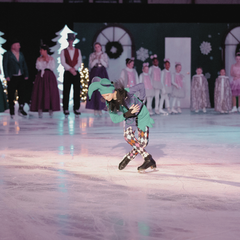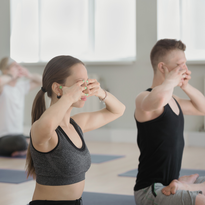 The Jester Doll takes a bow during the Nutcracker on Ice The Jester Doll takes a bow during the Nutcracker on Ice It’s easy to get down on ourselves in this sport because it’s so freaking difficult. There are so many ways a skill can go wrong - spins travel, turns scrape, jumps don’t go up, your feet don’t lean the right way or move quickly enough or move too quickly, the free leg bends, the arms get lost, the head wants to take the lead on takeoff, and your bum can hit the ground at any time. Even if we love the day-to-day grind and working ourselves to the bone–and you have to if you want to make any real progress– there will still be hard moments, weeks, months, and seasons. There will be times when we trip over our toe picks, fall on our kneecaps, can’t remember the steps, kick ourselves in the shin, slip off the heel, split a chin, have an asthma attack, develop tendonitis, collide with another skater, and maybe even break a bone or get a concussion. We get a goal in mind to motivate ourselves, and we know that progress is not a straight line, but when the bummers pile up, and it starts to seem that everyone else is having better days and making more progress than you... how do you keep going? For some adult skaters maybe it’s a little easier than for adolescents–for many adults, skating is their happy place outside of work and family stressors. But for teen and tween skaters who don’t yet have the gift of years to teach them perspective, it’s easy to look at someone else’s journey and feel dejected. Since 2020 one difficult situation after another has come my way. Some have been life-and-death situations, others financial, others mental and emotional, and others have simply been life-changing. And what I’ve come to really see from all of this is that there is a lot of suffering in the world. Everyone on this planet is dealing with something–some way more than others–and none of our blessings are guaranteed. Not a single one. At the time of writing this, I have not been on the ice or able to do a an asana based yoga practice in over 8 weeks due to a hip injury. I will soon have surgery, which will potentially mean another 5 months off. It is well-documented that exercise is a key component of physical and mental health. For many of us, skating is the main form of exercise to help us manage life’s daily stressors and keep our brains happy. For me, yoga is even more important for my mental health than skating. So, when we can’t skate or practice asana (the physical postures), or when we find ourselves feeling down and dejected about skating (or anything), what can we do to help? For me, the answer has been to practice gratitude. That may sound silly, because why be grateful when things have plummeted downhill? I certainly don't mean to deny your feelings in a “good vibes only” sort of way. Recognizing, acknowledging, and releasing emotions is key to our health. However, I also believe we can and should always find something to be grateful for. Since I have not been able to practice asana for what feels like a very long time, and I make efforts not to dwell on the negative, I have made gratitude a key component of my daily routine. (It’s all about where we direct our energy (brahmacharya). So, even though my hip pain is pretty constant, in some ways I feel better than I have in years. With gratitude, optimism is sustainable.
0 Comments
6/2/2023 0 Comments Do This Simple Breathing Exercise Anywhere to Regulate Emotions and Train Smarter Figure Skaters practice the Bee's Breath (Brhramari) Pranayama as part of their off-ice training Figure Skaters practice the Bee's Breath (Brhramari) Pranayama as part of their off-ice training You’re on a crowded session with the music blaring, and no one seems to be paying attention. You are stressed over schoolwork and are starting a new job this weekend, too. You just really, really wanted to work on your lutz (single, double, or triple?) this session, but a beginner keeps spinning in the lutz corner and a group of teens is full-on procrastination via socialization in the other. When you finally spot an opening to put a jump up, you’re already so agitated that the attempt turns into a massive flop. You need a quick exercise to get you back on track before trying again. Sure, a jump drill sometimes helps redirect your thoughts, but this agitation you’re feeling at this moment isn’t technical. It’s physiological…. Tightness in the chest, shallow breathing, tense shoulders, legs on the ready. Like a cat ready to pounce on its prey, you are ready to pounce into the opening in the traffic for that jump. Except… you are attempting a very technical skill that requires full-body coordination. And you must land on an ice knife with beauty and precision. Skating should be your happy place, not the source of your stress! There are simply too many stimuli! If only you could just block out the chatter, slow the breath, relax the shoulders, and calm the racing thoughts. The Bee’s Breath (Bhramari) technique - can help. |
Author // the skating yogiMy name is Sarah Neal. I have been immersed in the world of figure skating for over four decades. I have seen firsthand the abuse that happens at the higher levels of our sport and experienced how that trickles down into unhealthy training practices and habits at the grassroots. I have seen this play out in the operations of the very institutions that control our sport. Whether for a profession or hobby, pursuing skating should be a joyful, rewarding process, an opportunity for athletic and personal growth, and a place to build lasting friendships. Archives
March 2024
CategoriesAll Athlete Well Being Athlete Well-Being Deep Connections Embodied Movement And Meditation Practices Life After Competition Mindful Living |
Search by typing & pressing enter

 RSS Feed
RSS Feed